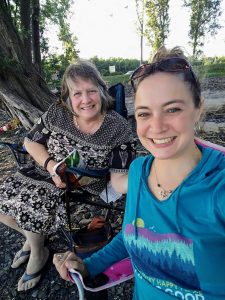Plan A Didn’t Work — Now What?
Written by |

I open my eyes, and the walls around me blur like a mirage.
I whisper through my post-intubated raw throat: “Did it work?”
My nurse replies: “No, they weren’t able to fix the problem.”
Preliminary tears well up in my anesthesia-drunken stupor. She must be lying, I think to myself. I’m suddenly convinced that my nurse is disguised as an enemy. Somebody wake me up from this nightmare, my mind screams through the medicated fog. This can’t be real.
My safe person (my mom) wasn’t allowed in recovery because of COVID-19 restrictions. The perceived enemy (my nurse) offered to get my mom on the phone so I could talk to her. I asked her what happened, hoping the answer would be different. She relayed the dreaded news confirming the surgery was unsuccessful. I promptly ended the conversation with “I have to go now” as I handed the phone to my archenemy. I wasn’t ready to accept the truth yet.
Thoughts swirled like a tornado among my in-and-out consciousness: Did the surgery happen? I wasn’t prepared for it not to work. I can’t face this yet. I’m not ready. There’s nothing left for me. Is this how it ends?
We live in a world shaped by plans. It’s society’s typical mode of operating. We make plans for our careers, families, vacations, and retirements. We’re used to things going as planned. Or at least the vast majority of the population is. When all our hope is placed in one event, though, this creates a sense of complete hopelessness if it doesn’t work out. We’re unable to see another way out or around the obstacle.
We dramatize our outcomes when we are surprised by the reality of our situations. In the moment, it seems like it’s the end of the world. In a way, it is — it’s the end of the world as we know it. Yes, R.E.M. feels my pain right now. It’s true, and we have to grieve the current form of our reality before we can move on.
It took me awhile to cry. Five days, to be exact. It seemed impossible to process that the two-hour surgery I underwent didn’t remedy my vascular issue. Knowing the doctor did his best to protect me rather than cause more harm was difficult to digest. Allowing myself to feel this heartbreak equaled accepting that the surgery didn’t fix my predicament; doing so would solidify the finality of the matter, and I wasn’t ready for that.
I know what the process looks like, but I’m always hesitant to begin. I avoided facing it by feeding my feelings with the doughnuts my sister brought and the pints of ice cream my best friend provided. When I actually dive in, it starts with instrumental worship music. Then, I unload my deepest, darkest sentiments on God between sobs into my carpet. Once the floodgates of pent-up emotions are released, the anger, deep sadness, and defeat flow freely. As I wade through the discomfort of the waves of grief, I feel relief washing over my tattered soul. I acknowledge this was really hard. I had all my faith in this surgery. And when it failed, I fell apart … naturally.
Managing expectations and disappointment is a constant balancing act of living with a chronic illness. We’re used to life not going as planned. We’re the kings and queens of adapting to change. But how do we manage expectations among hope and reality? We always hope for the best outcome. Sometimes reality doesn’t produce our anticipated results. We get stuck with the repercussions of an unsuccessful surgery (or fill-in-the-blank). When we don’t get the fix that we hoped for, what then? What now?
When we give ourselves the space to feel the grief, we set ourselves up for moving past it. When we come to a place of contentment regardless of the outcome, we make room for peace to direct our lives. From this place, we are more equipped to make sound choices for other possible avenues. Finding alternate solutions is easier with a clear lens, open mind, and healed heart.
So what’s next? Where do we go from here?
Life goes on. Time doesn’t stop for anybody. We have to keep living despite setbacks, disappointments, and failures. Yes, we continue to search the corners of the earth for solutions to our problems. But we also do what needs to be done right now, practice self-care, and enjoy the present.
For the time being, I still need Benjamin (my oxygen) for hikes, bike rides, and small airplanes. And until my current reality changes, I’ll do what we’ve all been created to do: LIVE. Not wait for “it” to be fixed. For today is all we have; tomorrow is never promised to anyone. C’est la vie.
***
Note: Cystic Fibrosis News Today is strictly a news and information website about the disease. It does not provide medical advice, diagnosis, or treatment. This content is not intended to be a substitute for professional medical advice, diagnosis, or treatment. Always seek the advice of your physician or other qualified health provider with any questions you may have regarding a medical condition. Never disregard professional medical advice or delay in seeking it because of something you have read on this website. The opinions expressed in this column are not those of Cystic Fibrosis News Today, or its parent company, Bionews Services, and are intended to spark discussion about issues pertaining to cystic fibrosis.









Leave a comment
Fill in the required fields to post. Your email address will not be published.